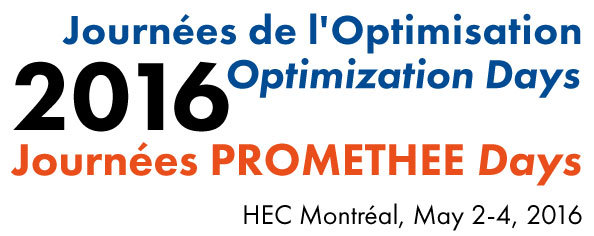
2016 Optimization Days
HEC Montréal, Québec, Canada, 2 — 4 May 2016

MA7 Transport / Transportation I
May 2, 2016 10:30 AM – 12:10 PM
Location: TAL Gestion globale d'actifs inc.
Chaired by Frédéric Quesnel
4 Presentations
-
 10:30 AM - 10:55 AM
10:30 AM - 10:55 AMThe liner shipping network speed optimization problem
We consider a given liner shipping network consisting of a set of cyclic periodic shipping services. The goal is to minimize fuel consumption by optimizing sailing speeds between ports, while respecting port-to-port container transit time limits through the network, including transshipment times between services. We present results for exact and heuristic solution methods.
-
 10:55 AM - 11:20 AM
10:55 AM - 11:20 AMImproving branching for the crew pairing problem with base constraints
Real-world crew pairing solvers consider restrictions on the total working time at each crew base. We propose a Danzig-Wolfe decomposition formulation for crew pairing problem that includes base constraints, restricting the total working. We propose different branching schemes to improve the computational time and the objective value of our instances.
-
 11:20 AM - 11:45 AM
11:20 AM - 11:45 AMMonthly crew pairing with 40 000 flights
The crew-pairing problem is modeled as a set-partitioning problem solved by columns generation. The Dynamic Constraints Aggregation speed-up the master problem and permits to solve a weekly window of 10 000 flights in few hours. The Rolling Horizon with weekly windows produces solution improved by up to 5%.
-
 11:45 AM - 12:10 PM
11:45 AM - 12:10 PMCross-dock door assignment problem under congestion
At an operational level, trucks arriving at a cross-dock terminal carrying a family of goods from several origins are assigned to strip doors. At strip doors, goods are unloaded, inspected and sorted according to their destinations. Unloaded goods are then transferred, using material handling equipments such as forklifts or conveyors, to their respective stack doors for loading on outgoing trucks to their destinations. Cross-dock Door Assignment problem (CDAP) seeks to optimally decide on the assignment of both incoming and outgoing trucks to strip and stack doors, respectively so as to minimize the material handling cost inside the cross-dock. We capture the effect of congestion due to excessive traffic assigned at strip/stack doors through a non-linear congestion function. This results in a non-linear integer programming problem. We develop three alternative solution approaches to solve the resulting model; one based on generalized Benders decomposition, and two based on alternative forms of Lagrangian relaxation.
